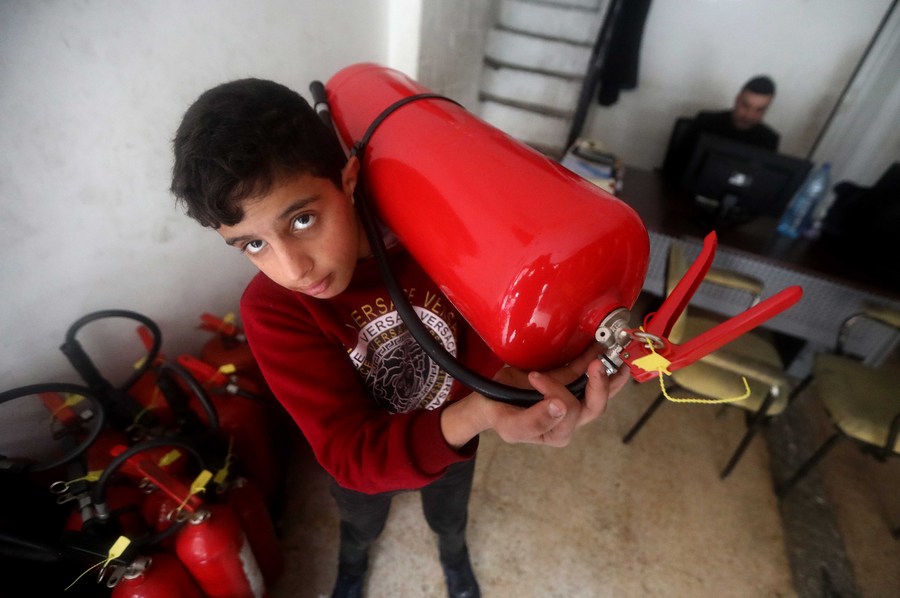
A boy works in a fire equipment store in Beirut, Lebanon, on Feb. 4, 2023. (Xinhua/Bilal Jawich)
"I hate to go to work; I just want to live like any other normal child," a Lebanese child laborer said, holding back his tears.
by Dana Halawi
BEIRUT, Feb. 6 (Xinhua) -- Zein Khalife, a 13-year-old boy, climbs several flights of stairs nearly daily to deliver meat orders to customers for his employer, a butcher in his neighborhood in Beirut, the Lebanese capital.
"I hate to go to work; I just want to live like any other normal child," Khalife told Xinhua, holding back his tears.
Khalife and his twin brother Mohamed are attending a public school. Still, they are forced to work with the same employer in the afternoons and on weekends to earn meager incomes to support their mother, a waitress serving coffee at a bank in Beirut for a monthly salary of only 4 million Lebanese pounds (about 67 U.S. dollars at the black market exchange rate).
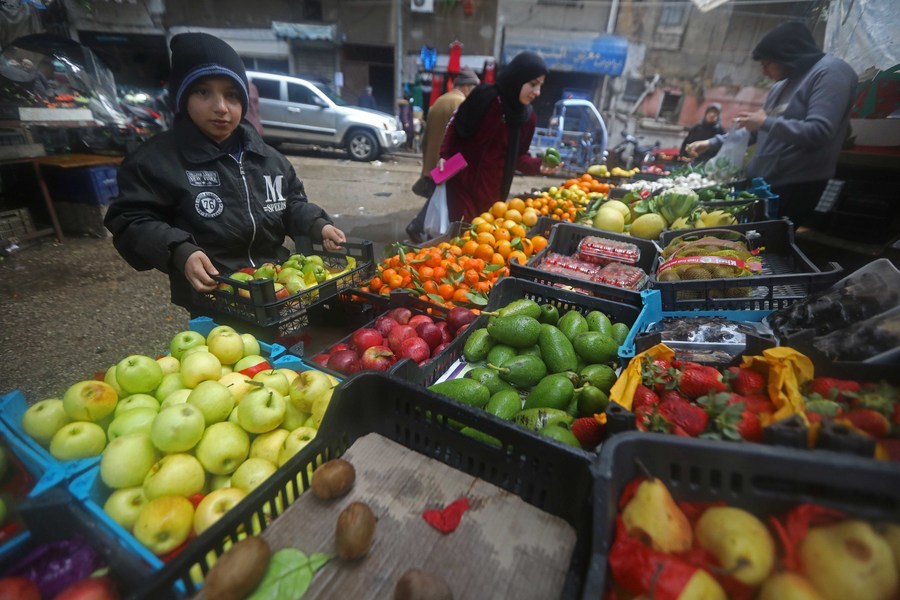
A boy works in a fruit store in Beirut, Lebanon, on Feb. 4, 2023.(Xinhua/Bilal Jawich)
In contrast, Khalife and his brother do not earn a fixed monthly salary but only tips from a few generous customers. "People sometimes shut the door in my face without giving me a penny; it's humiliating," Khalife said.
"I cry out every time when this happens because I get exhausted climbing stairs for as little as 20,000 Lebanese pounds a day or even nothing sometimes," he said.
GROWING CONCERN OVER CHILD LABOR
Lebanon's economic crisis, which started in 2019 and has been compounded by the COVID-19 pandemic and the devastating Beirut Port explosions, has turned many Lebanese children's lives upside down as soaring prices and increased unemployment have plunged numerous families into poverty.
A report released by the United Nations International Children's Emergency Fund (UNICEF) in 2022 revealed that 84 percent of Lebanese households did not have enough money to cover necessities, resulting in 23 percent of children going to bed hungry.
Another UNICEF report issued in December 2021 noted that 53 percent of Lebanese respondents in a survey considered child labor as their prime concern, up from 41 percent three months previously.
In an October 2021 survey, 12 percent of Lebanese families questioned said they sent at least one child to work, up from 9 percent six months earlier.
"Children as young as six are now working on farms, on the streets and illegally selling fuel, putting them at risk of serious burns and even death," the survey said.
When asked about her concerns over her children's health at work, Zeinab Ayoub, the mother of the Khalife brothers, cried as she talked about their sons' suffering from varicose veins and the pain due to stair climbing every day.
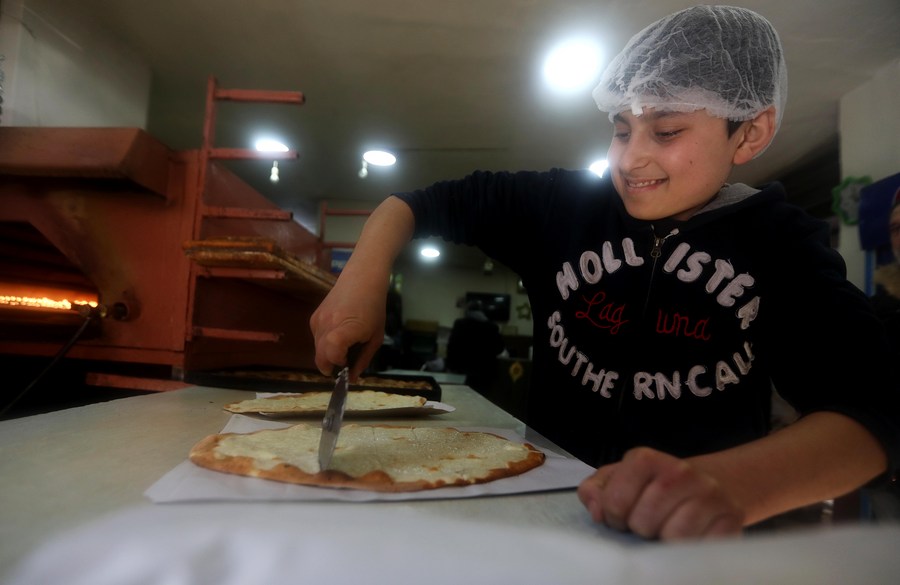
A boy works in a bakery in Beirut, Lebanon, on Feb. 4, 2023. (Xinhua/Bilal Jawich)
"It's difficult to see your children suffering without being able to do anything about it," she told Xinhua, adding that her family desperately needs the money earned by herself and two sons to cover the rising living cost.
Ayoub has tried to contact several international organizations to seek support for her children but failed to draw attention to her family's situation.
UNICEF'S REDOUBLING OF EFFORTS
In a written interview with Xinhua, the UNICEF said that it has recently established a helpline to provide Lebanese families with information about the programs, services and assistance it offers.
It said it has been working to tackle the child labor issue in Lebanon through different programs, including the one that supports the Lebanese Ministry of Education and Higher Education (MEHE) to guarantee quality education for public schools by giving cash for education to help the most marginalized children.
It also offers textbooks and learning materials to lower the burden on the poorest families and ensure teachers are supported with the training and materials they need to provide relevant education for children.
For out-of-school and vulnerable adolescents, the UNICEF said it supports them with technical and vocational skills to enhance their employability in safe and decent jobs.
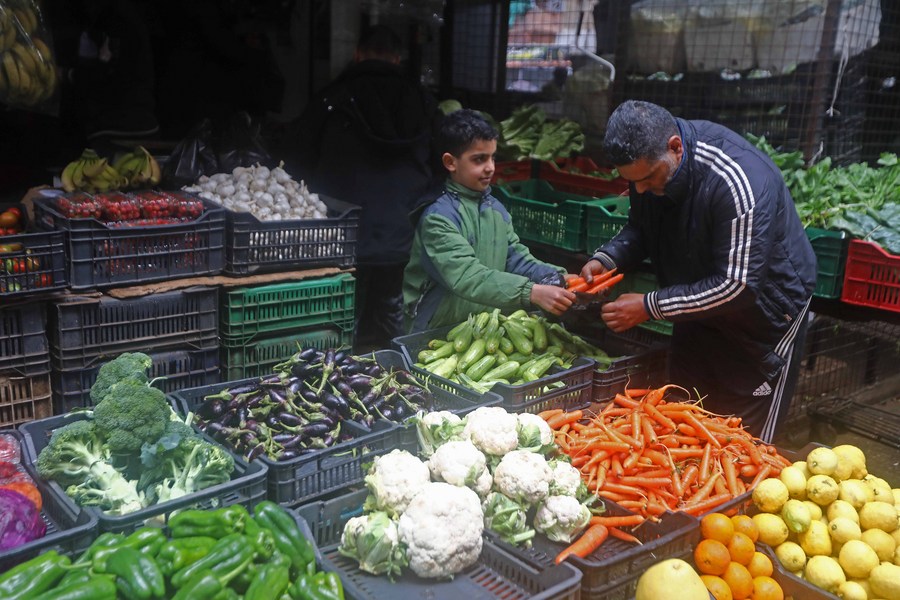
A boy works in a vegetable store in Beirut, Lebanon, on Feb. 4, 2023. (Xinhua/Bilal Jawich)
The UN agency also raises awareness about child labor and its risks, while providing children with mental health support through individual and group psychosocial support interventions to empower them and protect them from harm.
In mid-2021, the UNICEF launched Lebanon's first child grant to support households with children, which reached 130,000 vulnerable Lebanese children and Syrian or Palestinian refugee children involved in child labor, at risk of child marriage, out of school, or with disabilities.
However, the program has been downsized to reach 80,000 children only due to a shortage of funding.
RAISING AWARENESS AMONG CHILDREN
Hiba Abdine, a social worker working for the Syndicate of Social Workers in Lebanon, emphasized the importance of appointing social workers at schools capable of raising awareness among children about the jobs they are allowed to take and those that should be avoided at certain ages.
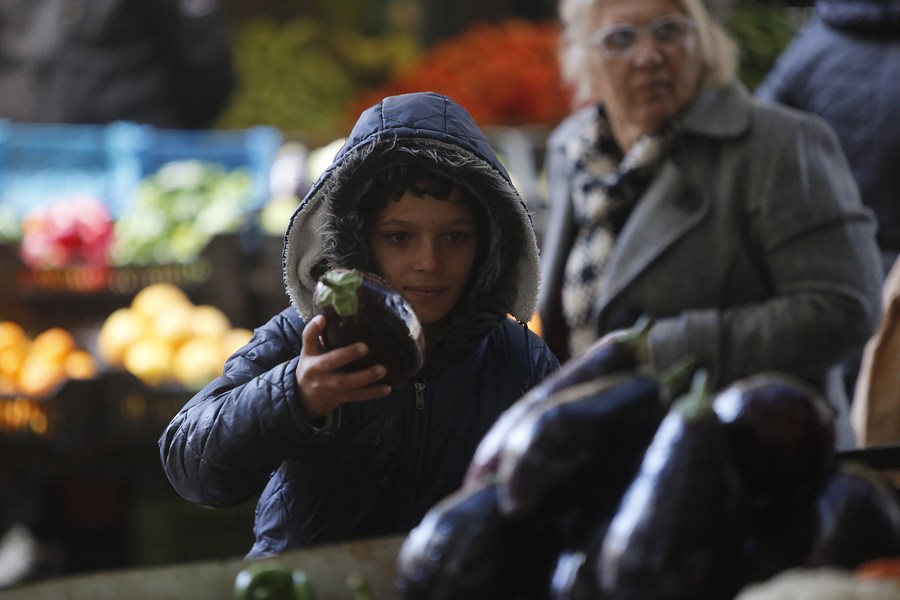
A boy works in a vegetable store in Beirut, Lebanon, on Feb. 4, 2023. (Xinhua/Bilal Jawich)
"The Syndicate of Social Workers has asked the MEHE to appoint social workers in schools all over Lebanon, but the ministry said it does not have a sufficient budget," she said.
Abdine said that social workers could also work with parents to coach them about the priority of sending their children to school. Then, if necessary, children can work after school for a specific time on specific jobs.
"All these steps must be effectively implemented right away because they need time to bring good results," she said.
Himaya, a Lebanese organization that works for child protection, told Xinhua that the ministries of labor, economy and justice should increase their cooperation to monitor the violations by employers using child labor so to protect the rights of these children.
It added that the employment criteria for each new industry or business must be specified by law, in addition to providing every working child with health and medical services. ■












